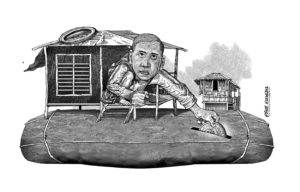
We hope the national government through its Department of National Defense, certify immediately an agreement signed between Cebu City Hall and the Capitol that would allow 4,000 residents to continue living on land that surrounds Camp Lapu-Lapu of the military’s Central Command.
If anything this would give the families who consist mostly of retired soldiers and their relatives some land they can call their own where they can live free from the constant uncertainty caused by plans of the previous Capitol administration to get back the land these families now occupy.
Despite former President Gloria Macapagal Arroyo’s proclamation declaring the 32 hectare land surrounding Camp Lapu-Lapu as a socialized housing site, a later discovery that showed the province owned the land allowed then Cebu Governor Gwendolyn Garcia to push for the province’s claim to the contested property.
With now House Speaker Gloria Macapagal Arroyo promising to lobby for Defense Secretary Delfin Lorenzana’s signing of the agreement, the deal may be all but sealed barring any complications, like Garcia’s return to the Capitol.
That said, if the agreement is signed before the elections it will have to be challenged in court which could take years before it is resolved. In the meantime, the families will have to agree to pay for their lots under the government’s community mortgage program.
And based on the statements of those settlers like Ma. Linda Paracuelles, the president of the Alliance of Barangay Apas Community Association (Abaca), they are willing to pay reasonable fees to the government if only to ensure that they continue to stay in the land they had lived on for generations.
This willingness to pay and to comply with laws set in the Constitution and enforced (supposedly but poorly) by government to legitimize their occupation of public land sets these families apart from the other settlers who simply move into any land either public or privately owned and stay there while expecting both the government and the public to help and understand their plight.
In extreme cases, urban poor groups like the controversial Kadamay forcibly move into public property and stake their claim on it even if the land is previously allocated to other people like the country’s soldiers.
While the government may be mandated to help the poorest of the poor especially those who cannot help themselves, it doesn’t exempt those who avail of such assistance from helping themselves considering that this assistance is funded by taxpayers’ money.